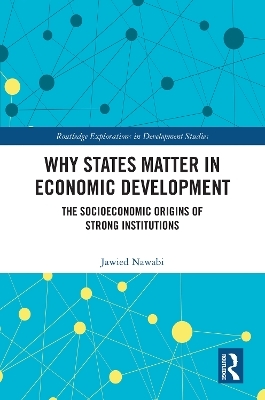
Why States Matter in Economic Development
The Socioeconomic Origins of Strong Institutions
Seiten
2024
Routledge (Verlag)
978-0-367-49036-2 (ISBN)
Routledge (Verlag)
978-0-367-49036-2 (ISBN)
This book examines the underlying conditions that give rise to effective, efficient, and bureaucratically inclusive states. A key reading for advanced students and researchers in these areas, this book draws real-life policy lessons for practitioners and policy makers in the developing world.
This book examines the underlying conditions that give rise to states that are effective, efficient, and bureaucratically inclusive with their developmental policies.
In spite of humanity’s significant advancements in science, technology and institutionalization of universal human rights conventions in the last seven decades, many countries are still failing to achieve successful development results. As a result, enormous levels of inequality, poverty, and malnutrition prevail. This book focuses on the role of the state in the political economy of development, tracing the socio-economic origins of effective state institutions from a comparative historical-institutional perspective. Drawing on the case studies of South Korea, Brazil, India, Spain, France, and England, the study looks at how good state institutions form, and why these are central to the socioeconomic advancement of their populations. The book contends that effective developmental states are those in which state actors are able to effectively diminish and co-opt the power of the country’s landed elites during the early years of state building. Effectively, the power balance between these two classes determines the developmental trajectory of the state. Considering agrarian reform as the foremost indispensable policy tool to open conditions for positive changes in effective taxation, education, healthcare, and strategic sustainable industrial policies, this analysis offers a significant contribution to the literature on the sociology of institutions and the political economy of development.
As well as being a key reading for advanced students and researchers in these areas, this book draws real-life policy lessons for practitioners and policy makers in the developing world.
This book examines the underlying conditions that give rise to states that are effective, efficient, and bureaucratically inclusive with their developmental policies.
In spite of humanity’s significant advancements in science, technology and institutionalization of universal human rights conventions in the last seven decades, many countries are still failing to achieve successful development results. As a result, enormous levels of inequality, poverty, and malnutrition prevail. This book focuses on the role of the state in the political economy of development, tracing the socio-economic origins of effective state institutions from a comparative historical-institutional perspective. Drawing on the case studies of South Korea, Brazil, India, Spain, France, and England, the study looks at how good state institutions form, and why these are central to the socioeconomic advancement of their populations. The book contends that effective developmental states are those in which state actors are able to effectively diminish and co-opt the power of the country’s landed elites during the early years of state building. Effectively, the power balance between these two classes determines the developmental trajectory of the state. Considering agrarian reform as the foremost indispensable policy tool to open conditions for positive changes in effective taxation, education, healthcare, and strategic sustainable industrial policies, this analysis offers a significant contribution to the literature on the sociology of institutions and the political economy of development.
As well as being a key reading for advanced students and researchers in these areas, this book draws real-life policy lessons for practitioners and policy makers in the developing world.
Jawied Nawabi is Associate Professor of Economics, Sociology, and International Studies at the City University of New York–Bronx Community College.
1: Introduction 2: Methodology and Definitions 3: The Lessons of European State Formation for the Developing Countries 4: The Socioeconmic Origins of South Korea’s Developmental State and Its Agro-Industrial Path to Development 5: Brazil’s Stunted Development: Neither Enough Order Nor Progress 6: India: Only a Developmental State Can Provide Roti, Kapada, and Makaan (Bread, Clothes, and Shelter) for the Nation 7: Conclusion and Transferrable Lessons
| Erscheinungsdatum | 21.04.2024 |
|---|---|
| Reihe/Serie | Routledge Explorations in Development Studies |
| Zusatzinfo | 6 Tables, black and white; 15 Line drawings, black and white; 15 Illustrations, black and white |
| Verlagsort | London |
| Sprache | englisch |
| Maße | 156 x 234 mm |
| Gewicht | 517 g |
| Themenwelt | Recht / Steuern ► Allgemeines / Lexika |
| Recht / Steuern ► EU / Internationales Recht | |
| Sozialwissenschaften ► Soziologie ► Spezielle Soziologien | |
| Wirtschaft ► Volkswirtschaftslehre ► Wirtschaftspolitik | |
| ISBN-10 | 0-367-49036-6 / 0367490366 |
| ISBN-13 | 978-0-367-49036-2 / 9780367490362 |
| Zustand | Neuware |
| Informationen gemäß Produktsicherheitsverordnung (GPSR) | |
| Haben Sie eine Frage zum Produkt? |
Mehr entdecken
aus dem Bereich
aus dem Bereich
Ausgrabungen der Zukunft in Los Angeles
Buch | Softcover (2023)
Assoziation A (Verlag)
CHF 33,55


